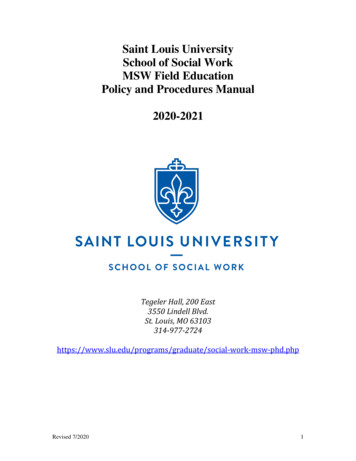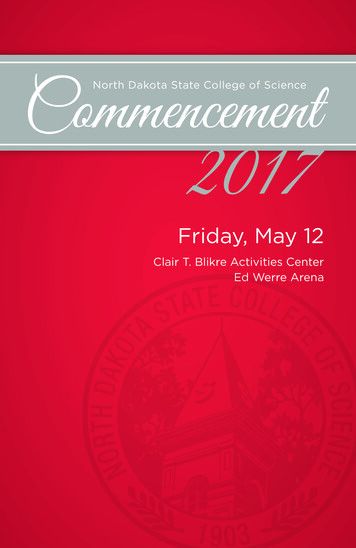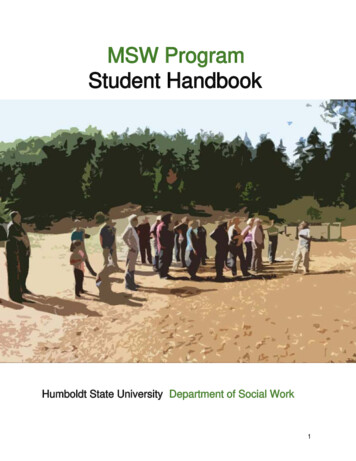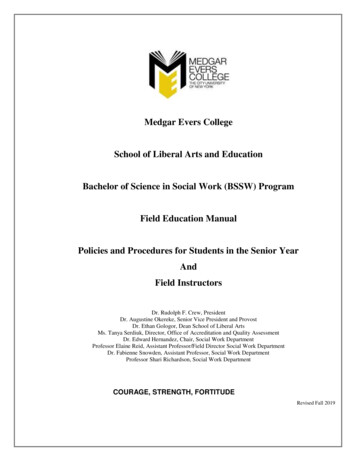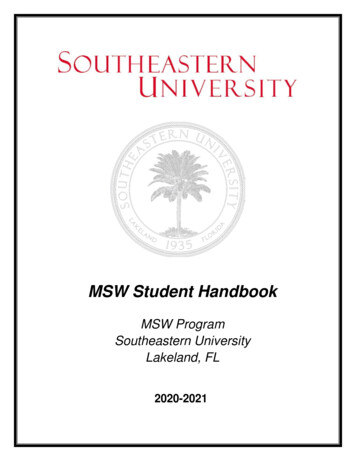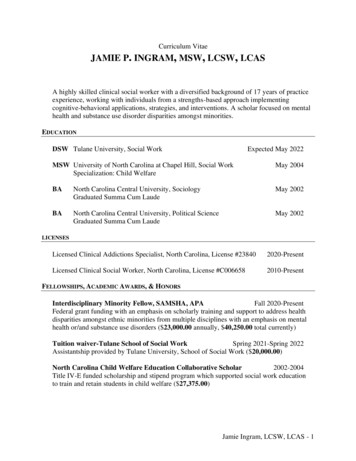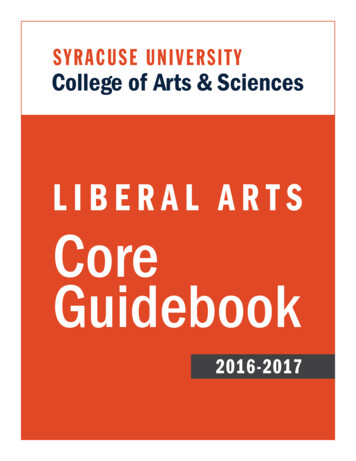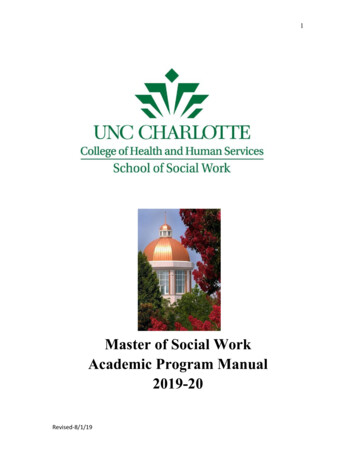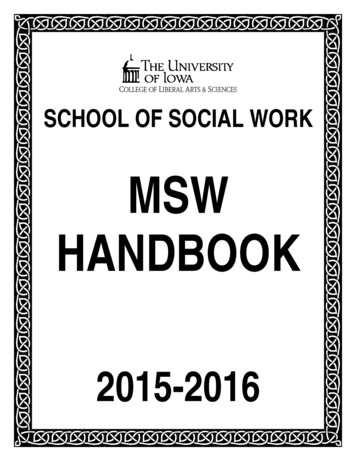
Transcription
SCHOOL OF SOCIAL WORKMSWHANDBOOK2015-2016
MSW HandbookPageWelcome from the Director, SSW Mission, Strategic Plan Goals . 1Sources of Information: MSW Director, Diversity Support, Faculty Advisors, Staff, etc.2Timelines and Deadlines 8MSW Program Goals, Foundation Curriculum, Competencies/Practice Behaviors 10Advanced Concentrations:Family Centered Practice . 13Integrated Practice . 14Course Matrixes . 18Advanced Concentrations Concepts and Designs . 25Registration Information . 29AppendixesAppendix A - Electives and Fields of Practice . . . .A-1Appendix B - University and School Policies . .B-1Appendix C- Committee and Administrative School Structure . .C-1Appendix D - Program Forms . D-1Appendix E - Des Moines Information .E-1
WELCOMEWelcome to The University of Iowa School of Social Work. You are beginning professional education in a School whichhas a history of commitment to social change, and a mission of preparing effective social work professionals andbuilding the knowledge base of social work practice. Social Work is distinctive among professions in the extent to whichits value base includes a commitment to social justice and social change, to serving the needs and changing theconditions of the poor and oppressed. These value commitments find particular expression in the School's focus onfamily systems as a theoretical perspective and on a family- and community-based approach to social work practice.Because it focuses on interactions within and between systems rather on individual psychopathology, the familysystems and community perspectives enables consideration of different system levels at the same time and providessocial workers with a particularly useful structure of organizing knowledge about clinical and community interventions,case management, program development, and policy analysis and advocacy.The School’s Director is Associate Professor, Sara Sanders, MSW, PhDMISSIONThe University of Iowa School of Social Work’s mission is to develop, disseminate, and integrate excellent andcompelling research-based knowledge, practice, and policy particularly as related to children, families, and older adults.Operating from strengths-based and systems perspectives, we educate our graduates to be culturally competentscholars and practitioners committed to social justice and social work values and ethics, prepared to serve in and havea positive impact on a broad range of family-centered and community-based practice settings throughout the state ofIowa and beyond.Achieving Distinction: Unique Characteristics and InnovationsThe University of Iowa School of Social Work is innovative in developing, disseminating, and integrating social workeducation, research, and public service. Some important innovations include: The University of Iowa has provided social work distance education for more than 45 years. Today, the MSW isoffered in four sites (Sioux City, Des Moines, Iowa City, and Quad Cities) ensuring that social work education isavailable throughout the state. Experiential learning through national and international immersion opportunities (past locations include Chicago,Philadelphia, Mexico, India, and El Salvador), collaboration with and sponsorship of “Wild Bill’s” a coffee shop staffedby people with disabilities, partnership on a statewide Latino Conference, and support of a Social Work CreativeWriting Workshop all reinforce our interdisciplinary and intercultural approaches. For more than 30 years, the School’s National Resource Center for Family Centered Practice (NRC/FCP) haspromoted family-centered, community-based, culturally competent practice within organizations and across systemsthrough research and evaluation, training and technical assistance, and information dissemination. The NRC hasworked in all fifty states and through international collaborations. The School has a longstanding and award-winning commitment to advancing cultural competence, which nowincludes offering a critical cultural competency certificate program for all University of Iowa undergraduate studentsand potentially all MSW students as well. The NRC/FCP’s work on Disproportionate Minority Contact has made Iowa a leader in reducing race-baseddisproportionality and disparities in child welfare and juvenile justice. The School is nationally known for its outstanding work in Child Welfare, Aging Studies, End of Life Care, andreducing Family Violence.2
THE UNIVERSITY OF IOWA SCHOOL OF SOCIAL WORKSTRATEGIC PLAN GOALS 2012-2017GOAL I: ENSURE STUDENT SUCCESSStrategy 1: Deliver a cutting-edge, innovative, curriculum with high quality programsStrategy 2: Recruit and enroll the most highly qualified applicants to the PhD programStrategy 3: Implement infrastructure changes necessary for student success.Strategy 4: Strengthen the UI certificate programs in Critical Cultural Competence (CCC) and the UI Aging StudiesProgram.GOAL II: PROMOTE DISCOVERY AND ENGAGEMENT OF FACULTY IN SCHOLARSHIP AND PRODUCTIVITY BENEFITING SOCIETYStrategy 1: Increase the number of tenure track faculty in the School who contribute to knowledge building in socialwork through their research.Strategy 2: Foster a culture in which every member of the faculty undertakes scholarship and productivity at thehighest level of quality, helping the School to climb in national visibility.Strategy 3: Optimize opportunities for faculty to seek promotion in rank.Strategy 4: Promote the research findings of faculty emphasizing their impact on the physical, psychological, socialand economic well-being of the citizens of Iowa and the nation.GOAL III: PROVIDE PUBLIC OUTREACH AND CIVIC ENGAGEMENT TO SERVE THE NEEDS OF THE STATE OF IOWA AND THE NATIONStrategy 1: Maintain educational commitment to BA and MSW programs serving geographically committed students inDes Moines, Quad Cities and Sioux CityStrategy 2: Increase the use of technology within the BA and MSW educational programs to meet the needs of the entirestate for professional social workersGOAL IV: INCREASE DIVERSITY AMONG STUDENTS, FACULTY, STAFF, AND FIELD INSTRUCTORSStrategy 1: Recruit and retain a diverse student body in the BA, MSW and PhD programsStrategy 2: Recruit and retain diverse and culturally competent faculty, staff, and field instructorsSOURCES OF INFORMATION IN THE SCHOOLMSW PROGRAM DIRECTORThe MSW Program Director is Clinical Associate Professor, Julia Kleinschmit. The MSW Program Director isresponsible for the development and maintenance of the MSW educational programs of the School and for resolving studentproblems related to the educational program and is an important resource for students. The MSW Program Director isavailable if faculty advisors are absent because of developmental leave.FACULTY ADVISORSFaculty Advisors are available as students explore their aptitude and motivation for a career in social work. They monitor thestudent’s progress through the curriculum and are part of the early and periodic evaluation of the student’s progress. FacultyAdvisors provide academic advising, and determine the application of specific graduate transfer courses (after the GraduateAdmissions office has received and approved the transfer) to the MSW plan of study. (See Planning, page 4). They alsoapprove changes in registration, to insure that student’s understand how this change will impact their plan of study. They are3
involved in approving change of status from part to full-time status and change of concentration. In the event that a concernis filed regarding a student's advancement in the program, the advisor is involved in assisting with the development of theremediation plan (see Student Advancement Policy in Appendix B). All faculty are available to students during their publishedoffice hours, or by appointment. Each student is assigned a faculty advisor and there is a procedure for requesting a changeof advisor, see Change of Advisor form, appendix D.DIVERSITY SUPPORT COORDINATORThe School of Social Work strives to provide a safe and supportive environment and to facilitate appreciation of diversitiesrepresented within the School and beyond. The Diversity Support Coordinator is available to assist all students when they feelmarginalized. This may be due to their culture, race, ethnicity, (dis)ability, family structure, sexual orientation, age, beliefsystem, religion or lack of religion, spirituality, or conflicts regarding students’ ability to incorporate personal beliefs with socialwork principles, values and standards. Consultation with the Diversity Support Coordinator is private, nonjudgmental andconfidential. The Diversity Support Coordinators are Jefri Palermo and Sandra McGee.STAFFThe following staff are available to assist students:Susan Dirks, Admissions and Programs CoordinatorSusan coordinates and manages information dissemination regarding admissions process/procedures for BA, MSW, Ph.D.Programs and manages applicant files and data. She coordinates and manages the registration/course enrollment/courseevaluation process insuring that departmental and university policies are adhered to by faculty and staff, and coordinatesand manages program related intra-departmental information systems. She staffs the Admissions Panels and maintainsthe applicant and student databases. She supports the Program Administrator, Program Directors, oversees studentemployees in the Iowa City office, and schedules classrooms.Kate Kemp, MSW, LISW, Program Administrator and Admissions DirectorKate administers and provides program planning for the educational programs of the School in support of theprogram directors (BA, MSW and PhD) and the School Director. She interprets and enforces University, College,School, CSWE policies and procedures, provides faculty and student advising consultation, and is responsible forensuring the programs comply with these policies and procedures. Also oversees information disseminationconcerning the educational activities and programs of the School.Jefri Palermo, Development CoordinatorJefri coordinates publicity, outreach and marketing for the School. She produces the alumni newsletter InService andmaintains the website, oversees the management of Wild Bill’s Coffeeshop, coordinates CEU events and alumnirelations for the School and assists faculty with research applications.Wynne Worley, Operations CoordinatorWynne Assists the Director and provides coordination and support for School operations, including space and equipment.Christy Thies, Des Moines Program CoordinatorChristy provides instructional support for the School of Social Work’s students, adjunct faculty and regular faculty atthe Des Moines center, including enhanced use of distance education strategies/technologies. She provides ongoing developmental activities to sustain/grow the MSW and BA-SW programs in Des Moines; and provides officecoordination and management for the Des Moines center.Chuck Wieland, Operations AdministratorChuck administers the Operations of the School including budget preparation and overseeing of financial accounts.He oversees research assistantship and teaching assistantship appointments, other departmental financial aid andaward processes, and can provide information regarding funding for student research projects.4
Administrative Faculty 2015-21065FACULTY PROGRAM ADMINISTRATION POSITIONSDirectorSara SandersNRC DirectorMiriam LandsmanBA Program DirectorMotier HaskinsMSW Program DirectorJulia KleinschmitAging Studies CertificateProgram DirectorMercedes Bern-KlugDirector of Field EducationLily FrenchCritical Cultural CompetenceCertificate CoordinatorMotier HaskinsDistance Education CoordinatorStephen CummingsDiversity Support CoordinatorsPh.D. Program DirectorCarol Coohey5Jefri Palermo andSandra McGee
HANDBOOKS and WWWThe purpose of the MSW Handbook is to assist access to information about the curriculum and sequencing ofcourses, selected University, School and Council on Social Work Education (CSWE) policies, and the administrativeand committee structure of the school. Many of the questions that arise during the course of the MSW program areanswered here. As a student in The University of Iowa School of Social Work you are bound by the Universityand School policies and accreditation rules.COMMUNICATIONSUniversity administrative office (such as the Registrar), social work faculty, staff and students rely upon email and listserves to communicate. You are expected to check your uiowa email account, even if you have a private emailprovider. It is important to check both email and mailboxes on a regular basis. Faculty staff and students utilizeemail list-serves to communicate regarding courses, events, etc. and many are posted on the School of Social Workwebsite. The staff in Iowa City and Des Moines are excellent resources and will refer you to the proper source ofinformation when you are in doubt. Be sure to check the UI web site or the School’s website to access information.STUDENT INPUTStudents provide feedback and have input into the program in several ways. Students serve on Curriculum, andDiversity Committees. (See Administrative Committee Structure of the School in Appendix C.) Students aresurveyed at the completion of foundation courses and prior to graduation. Alumni are surveyed at 1 and 5 yearsfollowing graduation. Students also evaluate each course and instructor using the university wide system ofassessing the Classroom Environment (ACE) forms. Additionally, students are asked, at the completion of eachcourse, to measure the degree to which they learned the course's objectives. Finally, students are frequentlyasked for input regarding course content (as with the cultural competence initiative), and satisfaction with theprogram through survey and/or focus groups. These inputs assist faculty with program improvement.Students are encouraged to organize in the Social Work Student Organization. A formal UI Graduate StudentAssociation is renewed each year and has a faculty liaison in each center or part-time program. One of the functionsof the organization is to provide student input to the School through the election of student representatives toCommittees as well as direct input to the Director, faculty and school administration. Watch for announcements bylist-serve and on the web-site for student leaders contact information and meeting times. Graduate students alsoparticipate in the UI Graduate Student Senate.It is important that students utilize these formal, as well as other informal, means of communicating about theireducational experience.PLANNING YOUR INDIVIDUALIZED PROGRAMMSW students, after accepting their offer of admission, receive a Planning Sheet which is initially provided by theProgram Administrator, and is based upon the information you have provided in your application and includes anygraduate transfer courses that might be applicable to the MSW * (see policy in Appendix B).This form isto be used as a planning guide with your faculty advisor and will be modified and updated with the advisor’sapproval. Each semester students are of early registration dates. You will also receive a schedule published bythe School listing all the courses we offer for the upcoming semester. Group advising and/or individual advisingwith faculty advisors is conducted in each location. You are required to meet with your faculty advisor shortlybefore the early registration period. Your faculty advisor will clear you for registration after you have met. You arealso required to keep your planning sheet up to date, and to have any modifications in your program approved bythe advisor. When modifications are made, you will file a revised plan with Susan Dirks (Iowa City, Quad Cities,6
and Sioux City) or Christy Thies (Des Moines) for your student file. Please keep a copy for yourself. This planningsheet is designed to help you plan your program, whether full time or part time, and to "get in writing" any specialarrangements made with your advisor and/or to keep a record of future plans - such as electives or thesis.Modifications to the structured sequenced program require not only advisor approval, but also MSW ProgramDirector, Field Director, and in some cases, Program Administrator. This is necessary to insure adherence toCSWE policy and also to adequately plan for class size and practicum placements. If, at any time, you havequestions about your plan of study, in addition to discussing this with your faculty advisor you may contact theProgram Administrator or MSW Director.OTHER SOURCES OF INFORMATIONThe University of Iowa Graduate College205 Gilmore Hall 335-2144Student Disability Services (SDS)3105 Burge Hall 335-1462335-1498 (text telephone)Graduate Ethnic Inclusion422 Gilmore Hall, 353-2584Women’s Resource and Action Center (WRAC)http://wrac.uiowa.edu/Division of Student Lifehttp://studentlife.uiowa.edu/249 Iowa Memorial Union 335-3557Many services including Tutor Referral130 N Madison 335-1486Writing Centerhttp://writingcenter.uiowa.edu/110 EPB 335-0188Student Life Cultural CentersAfro-American Cultural Center303 Melrose AVE 335-8296Latino-Native American Cultural Center308 Melrose AVE 335-8298The Asian Pacific American Cultural Center (APACC)223 Lucon DR 335-2719Lesbian, Gay, Bisexual, Transgender Center (LGBTRC)125 Grand Avenue CT 335-7123Speaking Centerfor-students/speaking-center153 EPB 335-0205Student Health Serviceshttp://studenthealth.uiowa.edu/4189 Westlawn 335-8370International Programs1111 University Capitol Centre 353-2700University Counseling chiatry3223 Westlawn 335-7294Community Based Volunteer ?title &field types of opportunities tid All&page 1Center for Diversity and Enrichment24 Phillips Hall 353-2537International Volunteer waThe Office of Equal Opportunity and Diversity, 202 Jessup Hall supports and enhances the University's commitmentto recruiting and retaining a diverse academic community of faculty, staff, and students in two inextricably linked ways: 1)providing expert advice, education, and services which ensure the University's compliance with all applicable federal,state, and University equal opportunity, affirmative action, nondiscrimination, and civil rights laws, regulations, andpolicies; and 2) providing leadership and resources that support the University's goal to foster a diverse and inclusiveUniversity community.Office of the University Ombudsperson - Located at C108 Seashore Hall, The Office of the Ombudsperson serves7
students, faculty and staff and offers informal resolution, mediation and/or negotiation to constituents. Ideally, the Officeexists to prevent conflicts from escalating beyond the ability of clients to resolve them informally. They spend considerabletime working with constituents and within departments advocating civility and mutual respect as the most productive avenueto successful problem solving. In an effort to represent the University’s commitment to fundamental fairness, they offer anindependent, impartial, confidential resource to all members of the University community. Confidentiality, neutrality andindependence are the three critical characteristics of the Office. The Ombudsperson responds to each client according tothe matter brought forward. Some contact the office for information only, some come to discuss options and seek advice,some come with serious complaints, grievances and issues which cannot be solved through regular channels.Student Legal Services — Located at 157 IMU, this office provides general legal assistance for students by law studentswho are under the close supervision of a licensed attorney. For a nominal fee, legal representation can be secured foranything from tenant-landlord disputes to small claims to criminal problems. A free advice clinic is offered for any registeredstudent every Friday from 1:30 4:30 p.m. The telephone number is 335-3276.Graduate Student Senate — Located at 205 Gilmore Hall (335-3260), this office houses the elected body through whichgraduate students express concern for their welfare at the University, develop and disseminate ideas for the improvementof graduate education, and contribute to the formation of general University policy.IMPORTANT TIMELINES OR DEADLINESSchedule of CoursesAll information provided by The University on policies and deadlines, registration procedures, fees, schedules ofregistration times and official university calendar are now published on the web:(http://www.registrar.uiowa.edu/default.aspx). The School of Social Work also produces its own Iowa City and OffCampus schedules.Foundation Year EventsWhile you are taking foundation coursework, these are some of the important events about which you will receive furtherdetails through list-serve postings:FallPlanning session (mandatory) for students sequenced for spring foundation practicum.Information session regarding the two advanced concentrations: Family and Integrated. Advising/informationsession regarding thesis option.Advising/information sessions with faculty advisor.Spring Practicum Agency Fair (in Iowa City for students).Planning session for advanced practicum for students entering placement the following fall. Group advising forsummer and fall registration. Advising/information sessions with faculty advisor.Advanced Year /EventsFallPracticum OrientationSubmission of Plan if you are a thesis candidate - 1st week of November.Spring Students who are planning to graduate need to meet several IMPORTANT deadlines this semester. As soon asthey are available, they will be posted by the student mailboxes and notices will be sent two weeks prior to each deadline.It is the student's responsibility to file this paperwork accurately and on time. Failure to meet these deadlines mayresult in the postponement of graduation until the following semester.DeadlinesThese are general timeframes. Exact dates are published each semester and are also available from the ProgramAdministrator.8
Application for DegreeFiled with the Program AdministratorRequest to confirm expected graduation date for Iowa Licensure ExamFiled with Program Administrator*Plan of Study (This is completed by the Program Administrator)*Request/Report Form for Final Examination if thesis candidateThesis candidates must contact Program Administrator to initiateFirst Deposit of Thesis to Graduate CollegeFinal Deposit of Thesis to Graduate CollegeLast Day Student May WithdrawApril Committee Signatures Due on All Final Exam Report.Last Practicum Seminar in Dec.Last Practicum Seminar in Dec.Early MarchEarly MarchEarly AprilEarly MayMid-Early MayMid-Early May*Students and their advisors will be notified by the Program Administrator if there are any requirements/hoursdeficiencies as the Plans of Study are prepared. Students will receive a Plan of Study copy in the mail after it isapproved by the Graduate College. Further information about required paperwork for Thesis is in Appendix B.Group Advising sessions conducted by the Program Administrator are held every semester prior to early registration inIowa City. This is a good time to have general questions answered and to get information about the upcoming semester'sschedules so you can plan ahead. You must also meet with your faculty advisor who authorizes you to register for theupcoming semester.GraduationThe School hosts graduation receptions annually for all students in Iowa City and Des Moines. Graduation events areheld in the QC and SC programs as each cohort complete their three year programs.9
THE MSW PROGRAMGoals of the MSW Program1) To prepare students to shape the profession’s future by providing education in family-based, community- based, andculturally competent practice approaches using the person in environment framework; and2) To prepare competent professionals for autonomous practice and leadership within the professional communitythat includes advanced interventions at multiple system levels, supervision, program development, programadministration, training, evaluation of practice, dissemination of new models of practice, and policy development.The MSW program has been continually accredited by the Council on Social Work education since 1951.The MSW Program prepares social workers for leadership in the profession and for advanced social work practice in one oftwo concentrations. Both concentrations allow students to develop advanced skills to work with families and communitiesand advocate for social change, while providing all students with the skills to work using an advanced generalist model. TheSchool offers the MSW Program at four sites across the state: Iowa City, Quad Cities, Des Moines, and Sioux City. Eachsite provides a structured sequence of courses as well as opportunities for individualized plans of study based on an adultlearning model. All sites have opportunities to access the wealth of resources of a Research University. The twoconcentrations of the program, Family-Centered Practice and Integrated Practice, offer students knowledge and skills forworking with children, elders, families, small groups, organizations and communities. Students are provided the opportunityto develop the competencies necessary for leadership in addressing the unique challenges of the state of Iowa, including ahigh proportion of elders, recent immigrants to rural communities, and rural poverty.The MSW Program develops high levels of skill in practice applying the values and ethics of the social work profession tocomplex ethical issues. The program has a strong liberal arts focus and the research mission of the University ensures thatstudents learn about faculty research, critical thinking, analytic and scientific ways of thinking, and practice and programevaluation.THE CURRICULUMFoundation CoursesThe School’s Mission and MSW Program Goals recognize the importance of building on the core competenciesidentified by CSWE for foundation level knowledge, skills and values. Some of the students received this basicfoundation in a BA Social Work or BSW program. For these students, redundancy is addressed by eliminating someof the coursework requirements in the MSW program. For students who come to the program from other disciplines,the MSW program provides the full foundation curriculum to ensure that students have sufficient knowledge and skillsto move to the advanced competencies.The MSW Goals recognize that graduates of the program will be not only advanced practitioners in autonomous practicebut also the future leaders of the profession. Without the attainment of the core competencies, students would not beprepared to move into their advanced concentrations. In the advanced concentrations, students learn in-depth practiceskills and knowledge based upon the concentration of their choice.The nine CSWE Social Work Competencies are listed below. Each competency describes the knowledge, values,skills, and cognitive and affective processes that comprise the competency at the generalist level of practice, followedby a set of behaviors that integrate these components. These behaviors represent observable components of thecompetencies, while the preceding statements represent the underlying content and processes that inform thebehaviors.Competency 1: Demonstrate Ethical and Professional BehaviorSocial workers understand the value base of the profession and its ethical standards, as well as relevant laws and regulations that may impact practice10
at the micro, mezzo, and macro levels. Social workers understand frameworks of ethical decision-making and how to apply principles of critical thinkingto those frameworks in practice, research, and policy arenas. Social workers recognize personal values and the distinction between personal andprofessional values. They also understand how their personal experiences and affective reactions influence their professional judgment and behavior.Social workers understand the profession’s history, its mission, and the roles and responsibilities of the profession. Social Workers also understand therole of other professions when engaged in inter-professional teams. Social workers recognize the importance of life-long learning and are committed tocontinually updating their skills to ensure they are relevant and effective. Social workers also understand emerging forms of technology and the ethicaluse of technology in social work practice. Social workers: make ethical decisions by applying the standards of the NASW Code of Ethics, relevant lawsand regulations, models for ethical decision-making, ethical conduct of research, and additional codes of ethics as appropriate to context; use reflectionand self-regulation to manage personal values and maintain professionalism in practice situations; demonstrate professional demeanor in behavior;appearance; and oral, written, and electronic communication; use technology ethically and appropriately to facilitate practice outcomes; and usesupervision and consultation to guide professional judgment and behavior.Competency 2: Engage Diversity and Difference in PracticeSocial workers understand how diversity and difference characterize and shape the human experience and are critical to the formation of identity. Thedimensions of diversity are understood as the intersectionality of multiple factors including but not limited to age, class, color, culture, disability andability, ethnicity, gender, gender identity and expression, immigration status, marital status, political ideology, race, religion/spirituality, sex, sexualorientation, and tribal sovereign status. Social workers understand
The MSW Program Director is responsible for the development and maintenance of the MSW educational programs of the School and for resolving student problems related to the educational program and is an important resource for students. The MSW Program Director is available if faculty advisors are absent because of developmental leave.
